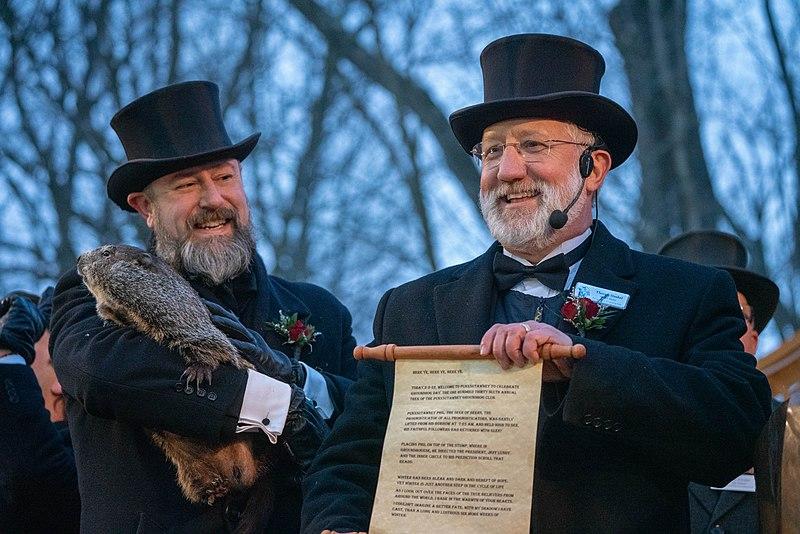Groundhog Day and Black History Month: Fighting the Same Battles Over and Over

I’m two days late to call this a January update, so we’re going to call this a combined January/February D&I update. As you know, I try to write something related to D&I in connection with current events each month, but since I missed January, this month you’re getting an extra-long edition. I’ve included it below, where you’ll see my thoughts on Groundhog Day in the context of Black History Month. Yes, those two go together, at least in my mind. Shout out to my wife for her editing. Trigger warning: it is decidedly political in nature.
As for a departmental update, we had a phenomenal Grand Rounds from Drs. Deyrup and Graves, in which they talk about the nature of race and racism, and how these concepts factor into medical education. I strongly encourage you to watch it if you missed it live.
Our D&I theme for the year is “Community,” and what better way for our department to support our community than through helping a family get into a home of their own? Please donate to the Habitat for Humanity house.
Groundhog Day and Black History Month
February 2: It’s Groundhog Day and it’s Black History Month. Humor me and I’ll explain why they are connected this year. While some of the department’s younger members might not have been born yet when the 1993 movie Groundhog Day was released, most of you probably understand the basic premise that Bull Murray’s character is reliving the same day (February 2) over and over.
Thus, the idea of Groundhog Day is linked to the sense that we have lived through something several times before. And right now, I’m getting that sense about the Supreme Court agreeing to hear arguments in the lawsuits against UNC and Harvard for their admissions policies. Affirmative action is back in the news and back in front of the justices.
Some background: UNC and Harvard were sued by a group that is seeking to outlaw the practice of factoring in race into admissions decisions. Quotas have long been illegal, but race is currently allowed to be used as “one factor among many” in admissions.
This group, called Students for Fair Admissions (which, for what it’s worth, is not led by students) purportedly does not believe that race should factor into decisions in any way and believes Harvard and UNC have illegally used race for admissions in violation of the 14th Amendment.
The Supreme Court heard affirmative action arguments in Regents of The University of California v Bakke (1978), Grutter v Bollinger (2003), and Fisher v University of Texas (2013 and 2016). We’ve been through this before, and now, it seems, we will live through this again. The Constitution of the United States hasn’t changed, but the constitution of the Court has, so most expect that the outcome will be different this time.
After all, it was the chief justice himself who wrote, “The way to stop discrimination on the basis of race is to stop discriminating on the basis of race.” Thus, many of us are poised to see the new majority reverse all 4 previous decisions and outlaw any use of race in admissions.
Here’s the problem with Chief Justice Roberts’ logic, though. No matter what the law says, race will continue to be a factor in admissions because decisions are made by humans and even the best-intentioned humans have racial biases. As a result of these implicit biases, ending affirmative action would not change the fact that letters of recommendation contain different language for applicants of color than for White applicants.
Interviews will still be granted at higher rates to White people regardless of resume similarities. And White interviewees will still be more likely than people of color to get offered positions, even with similar credentials. Despite living in the era when affirmative action is legal, people of color still experience discrimination at every step.
Ending affirmative action certainly won’t make this better. If Chief Justice Roberts wanted to end racial discrimination, he would support enhancing affirmative action to try to close the existing gap, not ending it. Chief Justice Roberts seems to believe it, but it’s a fallacy that affirmative action is a form of discrimination; in fact, its entire purpose is to reduce discrimination.
The anti-affirmative action plaintiff also bases their argument on misconceptions about what affirmative action actually is. Affirmative action is decidedly not the process of hiring unqualified people simply because of their race (or gender). No one thinks students should be admitted to a school at which they will not succeed simply to diversify a class. No one thinks that an unqualified person should be appointed to the Supreme Court simply because she’s a Black woman. Those are strawman arguments meant to deceive.
